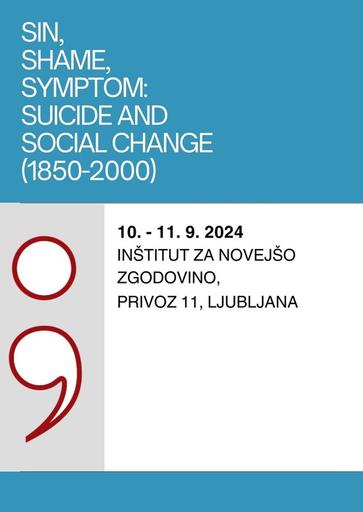/
Dogodki
/
Konference
The concept of heroic partisan suicide in socialist Slovenia


To delo avtorja Ivan Smiljanič je ponujeno pod Creative Commons Priznanje avtorstva-Nekomercialno-Deljenje pod enakimi pogoji 4.0 Mednarodna
Datoteke (1)
Opis
The partisan struggle during the Second World War represented a constitutive element of the nation-building of socialist Yugoslavia, and partisan sacrifices were considered the greatest display of self-sacrifice in the fight for freedom. Some partisans committed suicide in difficult circumstances, such as an ambush by a much stronger enemy or a severe wound. Reading monographs, newspaper articles and propaganda material published between 1945 and 1991 makes it clear that partisan suicides were considered one of the noblest heroic acts that a fighter could perform in the national liberation struggle, and the same opinion can be already traced among the partisans in the wartime. Many fighters who died in this way were given the title of national hero; there are about ten such partisans among Slovenians, and for some the circumstances of death have never been definitively clarified. Monuments were also regularly unveiled at the places of death of such partisans, although there was a certain element of discomfort in admitting that they had died by their own hand, since the inscriptions on the monuments almost never directly state that they committed suicide. The only example where this is more concretely indicated is the Okroglo Cave near Kranj, in which six partisans committed suicide during unequal clashes with the Germans in 1942; on the plaque next to the cave is engraved the inscription that "we ourselves proudly chose death". The very concept of partisan suicide was not explored in detail until the 1980s, when Vladimir Dedijer began to write about it in detail. He started the discussion about "heroic suicide" and tried to document cases from the Yugoslav partisan struggle, with which he was supposed to prove the heroic core of the entire movement. With his debates, he sparked some controversies in Yugoslav society. Partisan heroic suicide was therefore seen as a heroic act on the one hand, but at the same time there was also a certain discomfort in admitting that it was the highest possible act of a partisan, at least in relation to those executed by the occupier. The presentation will thus try to determine in more detail the place of heroic suicide in the Yugoslav statebuilding imaginary on the Slovenian example.
Metapodatki (12)
- identifikatorhttps://hdl.handle.net/11686/71063
- naslov
- The concept of heroic partisan suicide in socialist Slovenia
- avtor
- Ivan Smiljanič
- soavtor
- Nesa Vrečer (diskut.)
- Ana Cergol Paradiž (mod.)
- predmet
- samomori
- socializem
- partizani
- Slovenija
- opis
- The partisan struggle during the Second World War represented a constitutive element of the nation-building of socialist Yugoslavia, and partisan sacrifices were considered the greatest display of self-sacrifice in the fight for freedom. Some partisans committed suicide in difficult circumstances, such as an ambush by a much stronger enemy or a severe wound. Reading monographs, newspaper articles and propaganda material published between 1945 and 1991 makes it clear that partisan suicides were considered one of the noblest heroic acts that a fighter could perform in the national liberation struggle, and the same opinion can be already traced among the partisans in the wartime. Many fighters who died in this way were given the title of national hero; there are about ten such partisans among Slovenians, and for some the circumstances of death have never been definitively clarified. Monuments were also regularly unveiled at the places of death of such partisans, although there was a certain element of discomfort in admitting that they had died by their own hand, since the inscriptions on the monuments almost never directly state that they committed suicide. The only example where this is more concretely indicated is the Okroglo Cave near Kranj, in which six partisans committed suicide during unequal clashes with the Germans in 1942; on the plaque next to the cave is engraved the inscription that "we ourselves proudly chose death". The very concept of partisan suicide was not explored in detail until the 1980s, when Vladimir Dedijer began to write about it in detail. He started the discussion about "heroic suicide" and tried to document cases from the Yugoslav partisan struggle, with which he was supposed to prove the heroic core of the entire movement. With his debates, he sparked some controversies in Yugoslav society. Partisan heroic suicide was therefore seen as a heroic act on the one hand, but at the same time there was also a certain discomfort in admitting that it was the highest possible act of a partisan, at least in relation to those executed by the occupier. The presentation will thus try to determine in more detail the place of heroic suicide in the Yugoslav statebuilding imaginary on the Slovenian example.
- založnik
- Inštitut za novejšo zgodovino
- datum
- 11. 09. 2024
- tip
- video
- jezik
- Angleščina
- jeDelOd
- pravice
- licenca: ccByNcSa
